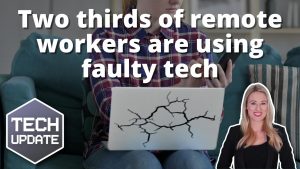 A new report has discovered that 67% of remote workers are using faulty hardware when they work remotely.
A new report has discovered that 67% of remote workers are using faulty hardware when they work remotely.
Often that’s because they’ve accidentally damaged the hardware themselves… they don’t want to admit it to their boss in fear of getting into trouble.
A refurbished technology company surveyed 2,500 employees and found that laptops were most likely to be broken, followed by keyboards, monitors, and PCs.
Most of the time the damage was done by spilled food and drink. Other causes of damage included other people in the house – such as a partner or housemates – and of course, pets.
We’ve all watched in horror as a cat brushes up against a full glass of water next to a laptop…
While more than half of people try to fix the damage, and 81% of people continue to use their wonky device with limited features, a third of workers switch to their personal devices instead.
Besides causing a loss of productivity, using personal devices could also be a huge data security risk for your business.
Most likely their personal laptop doesn’t have as much security protection as their work laptop, such as:
- Security software
- Data encryption and backup
- Enhanced password protection such as multi-factor authentication
Their personal devices also aren’t being monitored by your IT support partner.
When an attacker gains access to an unmanaged device, if it’s connected to your network, it’s possible they can get access to the wider network, and all of your business’s data. Yes, even your cloud data.
Attacker access can result in your data being stolen and sold. Or worse, your data being encrypted so it’s useless to you – and you must pay for its return. Data held for payment is called a ransomware attack and it’s the greatest cyber security threat to your business right now.
It’s not just access to your data that’s the problem. After a ransomware attack, there is a huge time and financial cost involved in making sure your network is clean, protected and secured.
Our advice is to make sure that everyone in your business understands the risks involved with using personal devices for work, whether they work remotely or not.
You might want to set a golden rule that all work must be done on business devices only.
You could also create a culture where it’s OK if a device gets damaged, so long as it’s reported quickly.
Windows Virtual Desktops are a great way to enable remote workers, improve security, and eliminate frustration.
If you need any help choosing the right technology or cyber security approach for your team, or creating new policies to help your staff choose to do the right thing, I'd love to hear from you.



